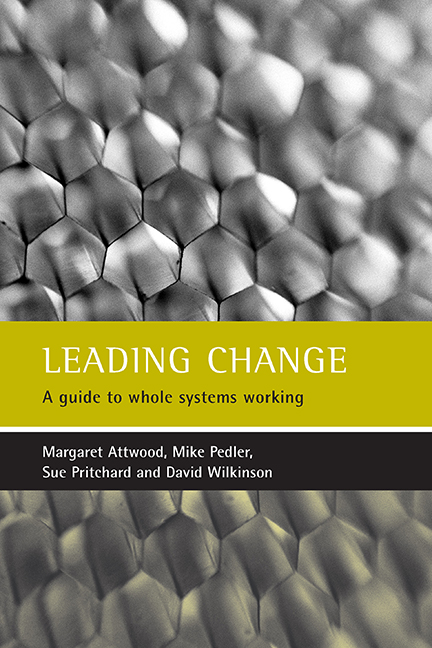Book contents
- Frontmatter
- Contents
- Foreword
- Foreword
- Prologue
- one Why do we need whole systems change?
- Two How Do We Put These Fine Words Intoaction? An Overview of Whole Systems Development
- Three The emerging practice of wholesystems development
- Four Leadership: keeping the big picture in view
- Five Public learning
- Six Valuing difference and diversity: getting the whole systeminto the room
- Seven Meeting differently: large and small group working
- Eight Follow-through and sticking with it
- Nine From organisations to networks
- Ten Confirming cases: local problems andlocal solutions within whole systems
- Epilogue
- Bibliography
- Index
one - Why do we need whole systems change?
Published online by Cambridge University Press: 20 January 2022
- Frontmatter
- Contents
- Foreword
- Foreword
- Prologue
- one Why do we need whole systems change?
- Two How Do We Put These Fine Words Intoaction? An Overview of Whole Systems Development
- Three The emerging practice of wholesystems development
- Four Leadership: keeping the big picture in view
- Five Public learning
- Six Valuing difference and diversity: getting the whole systeminto the room
- Seven Meeting differently: large and small group working
- Eight Follow-through and sticking with it
- Nine From organisations to networks
- Ten Confirming cases: local problems andlocal solutions within whole systems
- Epilogue
- Bibliography
- Index
Summary
Governments the world over are desperate to find ways of delivering better services and new forms of governance that are responsive to user, citizen and community needs. Economic forces and globalisation have pushed these previously domestic matters into a wider international context. Government priorities worldwide centre on stabilising national economies and improving public services, especially health and education, in the face of electorates apparently reluctant to pay higher taxes. The clarion call of politicians is ‘Delivery,delivery, delivery’. Their political lives now depend on it. But do politicians, their civil servants and managers have the conceptual, institutional and practical tools that are fit for this purpose?
The answer to the question seems to be no, at least not in any consistent sense. Top-down change initiatives increase in the hope of a ‘big’ answer around the corner. Private sector ideas such as internal markets, hit squads of super managers and tougher inspection regimes are imported in the hope of a fix. Yet many of these ideas are deeply flawed and not even effective in the commercial settings where they originate (Heller, 2001). However, while leaders are driven to desperate searches for big solutions, there are numerous examples of exciting innovations at the local level. Despite the persistent mantra of learning from best practice, much of this local innovation is not widely sharedand gets lost.
Whole systems approaches are rooted in years of evidence-based practice in public, private, voluntary and community domains (Wilkinson, 1997; Wilkinson and Appelbee, 1999). Despite the political slogan that ‘What works is what counts’, service improvements are ‘constructed’ and delivered through organisational frameworks and practices that have not themselves been subject to evidence-based enquiry. As Robert Heller puts it:
These schemes are devised, usually at ministerial behest, by civil servants who know little about management, and probably think less, and who are not expert in the practice of medicine, education, justice or transport. The inevitably misshapen plans are sold to politicians even less qualified than the Whitehall wizards. (Heller, 2001, p 9)
Whole systems approaches do not offer a single technique or new big answer. A large part of the problem is that we live in the continuing hope that we either have, or are about to discover, the final answer. There are no solutions that can be programmed in from the top.
- Type
- Chapter
- Information
- Leading ChangeA Guide to Whole Systems Working, pp. 1 - 18Publisher: Bristol University PressPrint publication year: 2003



